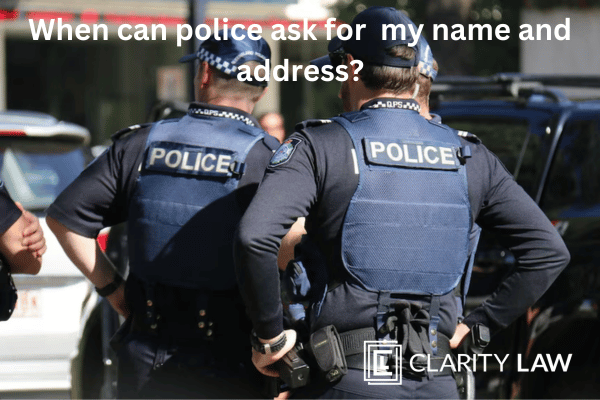
Queensland Police can, unsurprisingly, exercise a wide variety of quite coercive powers. We all know police can arrest and detain people, seize evidence related to crime, and compel people to provide information. These powers are all necessary so police can carry out their important function of investigating unlawful conduct and charging suspects.
What people may not know is police power is not unlimited, and there are important safeguards in place to ensure police know the limits of their powers and do not exceed them.
A police officer may require you to state your correct name and address in prescribed circumstances.
The police officer may also require you to give evidence of the correctness of the stated name and address if it would be reasonable to expect you to be in possession of evidence of the correctness of your name or address or to otherwise be able to give that evidence.
So when can police ask for my name and address?
The prescribed circumstances in which police can require you to state your name and address in Queensland are as follows—
-
a police officer finds you committing an offence;
-
a police officer reasonably suspects you have committed an offence;
-
a police officer is about to take—
o your fingerprints; or
o a DNA sample from you;
-
a police officer is attempting to enforce a warrant, forensic procedure order or serve on you—
o a forensic procedure order; or
o a summons; or
o another court document;
-
a police officer reasonably suspects you have been or are about to be involved in domestic violence or associated domestic violence;
-
a police officer reasonably suspects you may be able to help in the investigation of—
o a domestic violence or associated domestic violence; or
o a relevant vehicle incident;
-
a police officer reasonably suspects you may be able to help in the investigation of an alleged indictable offence because you were near the place where the alleged offence happened before, when, or soon after it happened;
-
you are in control of a vehicle that is stationary on a road or has been stopped;
-
a police officer is about to give, is giving, or has given you a police banning notice;
-
a police officer is about to give, is giving, or has given you—
o a public safety order;
o a restricted premises order;
o a fortification removal order;
-
a police officer reasonably suspects you have consorted, are consorting, or likely to consort with 1 or more recognised offenders.
If a police officer is speaking to you and you do not know or understand why, you are entitled to ask the officer the reason for speaking to you and if the officer is requesting your name and address, you may ask the reason for that, too. But, if you are given an answer other than “because I said so” it is best to comply, as you can be charged with an offence of contravening a direction or requirement of a police officer. It is a fine only offence.
You are entitled to ask a police officer to provide his or her name, rank and identification number. You may ask a police officer to record an interaction the officer is having with you, or you may wish to record the interaction yourself.
If police ask you questions which you believe are in connection with an offence in which you are a suspect, you have a right to refuse to answer those questions and seek legal advice.
Conclusion
As can be seen, there are a wide variety of circumstances where police may ask you your name and address, but it is important police explain why such details are required. There all sorts of reasons why police interact with the public, and the taking of your details will generally go no further than taking a note in a notebook. If you are subsequently charged, it is strongly recommended you contact a lawyer, and you should certainly contact a lawyer before any proposed interview.






